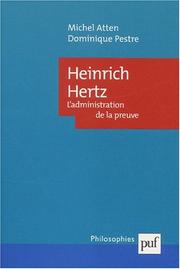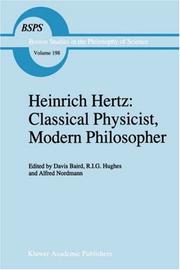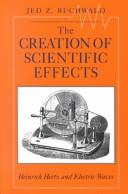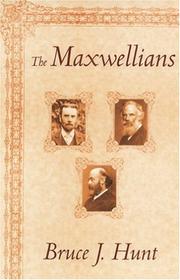| Listing 1 - 10 of 10 |
Sort by
|
Book
ISBN: 3846748099 Year: 2009 Publisher: Brill Academic Publishers
Abstract | Keywords | Export | Availability | Bookmark
 Loading...
Loading...Choose an application
- Reference Manager
- EndNote
- RefWorks (Direct export to RefWorks)
Das sichtbare Licht, einstmals ein göttliches, ist durch die Arbeit des deutschen Physikers Heinrich Hertz zu einem kleinen Ausschnitt des elektromagnetischen Spektrums degradiert worden. Jenseits der Regenbogenfarben lauern harmlose Radio- und Radarwellen, aber auch gefährliche Röntgen- und Gammastrahlen. Wie haben sie Architektur, Design und Kunst verändert? Zehn bekannte Autoren geben darauf eine Antwort. Mit Beiträgen von Volker Albus, Beatriz Colomina, Dietmar Dath, Anthony Dunne, Achim Heidenreich, Sabine Himmelsbach, Heiner Mühlmann, Philippe Rahm und Stephan Trüby.
Book
Year: 1894 Publisher: London : The Electrician,
Abstract | Keywords | Export | Availability | Bookmark
 Loading...
Loading...Choose an application
- Reference Manager
- EndNote
- RefWorks (Direct export to RefWorks)
Book
Year: 1977 Publisher: Leipzig : Teubner,
Abstract | Keywords | Export | Availability | Bookmark
 Loading...
Loading...Choose an application
- Reference Manager
- EndNote
- RefWorks (Direct export to RefWorks)

ISSN: 07661398 ISBN: 213052575X 9782130525752 Year: 2002 Volume: 151 Publisher: Paris : Presses universitaires de France,
Abstract | Keywords | Export | Availability | Bookmark
 Loading...
Loading...Choose an application
- Reference Manager
- EndNote
- RefWorks (Direct export to RefWorks)
Science --- Sciences --- Experiments --- Philosophy --- Expériences --- Philosophie --- Hertz, Heinrich, --- Expériences
Book
Year: 1895 Publisher: Leipzig : Johann Ambrosius Barth,
Abstract | Keywords | Export | Availability | Bookmark
 Loading...
Loading...Choose an application
- Reference Manager
- EndNote
- RefWorks (Direct export to RefWorks)
Physique --- Oeuvres reunies --- Hertz, Heinrich --- Physique --- Oeuvres reunies

ISBN: 079234653X 9048148812 9401588554 Year: 1998 Volume: 198 Publisher: Dordrecht ; Boston ; London Kluwer Academic
Abstract | Keywords | Export | Availability | Bookmark
 Loading...
Loading...Choose an application
- Reference Manager
- EndNote
- RefWorks (Direct export to RefWorks)
The sub-title of this symposium is accurate and, in a curious way, promises more than it states: Classical Physicist, Modem Philosopher. Heinrich Hertz, as the con summate experimentalist of 19th century technique and as brilliant clarifying critic of physical theory of his time, achieved one of the fulfilments but at the same time opened one of the transition points of classical physics. Thus, in his 'popular' lecture 'On the Relations Between Light and Electricity' at Heidelberg in the Fall of 1889, Hertz identified the ether as henceforth the most fundamental problem of physics, as the conceptual mystery but also the key to understanding mass, electric ity, and gravity. Of Hertz's demonstration of electric waves, Helmholtz told the Physical Society of Berlin: "Gentlemen! I have to communicate to you today the most important physical discovery of the century. " Hertz, philosophizing in his direct, lucid, pithy style, once wrote "We have to imagine". Perhaps this is metaphysics on the horizon? In the early pages of his Principles of Mechanics, we read A doubt which makes an impression on our mind cannot be removed by calling it metaphysical: every thoughtful mind as such has needs which scientific men are accustomed to denote as metaphysical. (PM23) And at another place, concerning the terms 'force' and 'electricity' and the alleged mystery of their natures, Hertz wrote: We have an obscure feeling of this and want to have things cleared up.
Physicists --- -Physics --- -Natural philosophy --- Philosophy, Natural --- Physical sciences --- Dynamics --- Physical scientists --- Biography --- History --- -Hertz, Heinrich --- Hertz, Heinrich --- -Influence --- Physics --- Biography. --- -Biography --- Influence --- 19th century --- Germany --- Natural philosophy --- Hertz, Heinrich, --- Hertz, Heinrich Rudolf, --- Hertz, H. --- Influence. --- Philosophy and science. --- History. --- Physics. --- Philosophy of Science. --- History, general. --- History and Philosophical Foundations of Physics. --- Annals --- Auxiliary sciences of history --- Science and philosophy --- Science
Book
Year: 1924 Publisher: Paris : Gauthier-Villars et Cie,
Abstract | Keywords | Export | Availability | Bookmark
 Loading...
Loading...Choose an application
- Reference Manager
- EndNote
- RefWorks (Direct export to RefWorks)
Électricité --- Ondes radioélectriques --- Cinéma --- Imprimerie --- Gaz --- Éclairage électrique --- Chauffage électrique --- Lampes à incandescence --- Réfrigération et appareils frigorifiques --- Histoire. --- Appareils et matériel --- Liquéfaction --- Hertz, Heinrich

ISBN: 0226078914 128305812X 9786613058126 9780226078915 0226078876 9780226078878 0226078884 9780226078885 9781283058124 6613058122 Year: 1994 Publisher: Chicago University of Chicago Press
Abstract | Keywords | Export | Availability | Bookmark
 Loading...
Loading...Choose an application
- Reference Manager
- EndNote
- RefWorks (Direct export to RefWorks)
This book is an attempt to reconstitute the tacit knowledge-the shared, unwritten assumptions, values, and understandings-that shapes the work of science. Jed Z. Buchwald uses as his focus the social and intellectual world of nineteenth-century German physics. Drawing on the lab notes, published papers, and unpublished manuscripts of Heinrich Hertz, Buchwald recreates Hertz's 1887 invention of a device that produced electromagnetic waves in wires. The invention itself was serendipitous and the device was quickly transformed, but Hertz's early experiments led to major innovations in electrodynamics. Buchwald explores the difficulty Hertz had in reconciling the theories of other physicists, including Hermann von Helmholtz and James Clerk Maxwell, and he considers the complex and often problematic connections between theory and experiment. In this first detailed scientific biography of Hertz and his scientific community, Buchwald demonstrates that tacit knowledge can be recovered so that we can begin to identify the unspoken rules that govern scientific practice.
Electric waves. --- Physicists --- Physical scientists --- Hertzian waves --- Electromagnetic theory --- Waves --- Hertz, Heinrich, --- Hertz, Heinrich Rudolf, --- Hertz, H. --- Electric waves --- Ondes électriques --- Physiciens --- electric waves, heinrich hertz, science, biography, physics, germany, lab notes, invention, electromagnetic, wires, innovation, discovery, experiment, scientific method, community, james clerk maxwell, hermann von helmholtz, tacit knowledge, electrodynamics, induction, cathode ray, energy, radiators, waveguides, fechner-weber theory, conductors, polarization, charge, nonfiction.
Digital
Abstract | Keywords | Export | Availability | Bookmark
 Loading...
Loading...Choose an application
- Reference Manager
- EndNote
- RefWorks (Direct export to RefWorks)
Einthoven, Willem --- Hertz, Heinrich Rudolf --- Lumière (gebroeders) --- Marconi, Guglielmo --- Ostwald, Wilhelm --- Röntgen, Wilhelm Conrad --- Elektromagnetisme --- Film (cinematografie) --- Draadloze datacommunicatie --- Telegrafie --- Röntgenstraling --- Elektrocardiografie --- Chemie --- Reactiesnelheid --- Fysica --- Chemische reactie --- Geschiedenis --- Techniek (wetenschap)

ISBN: 0801482348 9780801482342 0801426413 1501703277 Year: 2005 Publisher: Ithaca : Baltimore, Md. : Cornell Univ. Press, Project MUSE,
Abstract | Keywords | Export | Availability | Bookmark
 Loading...
Loading...Choose an application
- Reference Manager
- EndNote
- RefWorks (Direct export to RefWorks)
James Clerk Maxwell published the Treatise on Electricity and Magnetism in 1873. At his death, six years later, his theory of the electromagnetic field was neither well understood nor widely accepted. By the mid-1890s, however, it was regarded as one of the most fundamental and fruitful of all physical theories. Bruce J. Hunt examines the joint work of a group of young British physicists-G. F. FitzGerald, Oliver Heaviside, and Oliver Lodge-along with a key German contributor, Heinrich Hertz. It was these "Maxwellians" who transformed the fertile but half-finished ideas presented in the Treatise into the concise and powerful system now known as "Maxwell's theory."
Electromagnetic theory --- Physics --- Physicists --- Natural philosophy --- Philosophy, Natural --- Physical sciences --- Dynamics --- Light, Electromagnetic theory of --- Electric fields --- Magnetic fields --- History. --- Maxwell, James Clerk, --- Lodge, Oliver, --- Heaviside, Oliver, --- Khevisaĭd, Oliver, --- Maksvell, Dzhems Klerk, --- Maxwell, J. Clerk --- Maxwell, J. C. --- Maxwell, Clerk, --- Maksvell, Dzheĭms Klerk, --- Fitzgerald, George Francis, --- Physiciens --- History --- Biography --- Biographie --- Great Britain --- Electromagnetic theory - History. --- Physics - Great Britain - History. --- Maxwell, James Clerk, 1831.1879. --- Fitzgerald, George Francis, 1851-1901. --- Lodge, Oliver, Sir, 1851-1940. --- Heaviside, Oliver, 1850-1925. --- Physicists - Great Britain - Biography. --- Rezeption --- Maxwellsche Theorie --- Entwicklung --- Elektromagnetische Welle --- Physics. --- Physicists. --- Electromagnetic theory. --- Physical scientists --- Fitzgerald, George Francis. --- Heaviside, Oliver. --- Lodge, Oliver. --- Maxwell, James Clerk --- Lodge, Oliver --- Hertz, Heinrich --- Heaviside, Oliver --- Fitzgerald, George Francis --- Great Britain. --- Elektrische Welle --- Welle --- Elektromagnetisches Feld --- Ursprung --- Entwicklungsstadium --- Fortschritt --- Entstehung --- Evolution --- Feldtheorie --- Maxwell-Theorie --- Elektrodynamik --- Elektromagnetismus --- Maxwellsche Gleichungen --- Fortwirken --- Nachwirkung --- Nachleben --- Wirkungsgeschichte --- Aneignung --- Auswirkung --- Fortleben --- Fitzgerald, G. F. --- Lodge, Oliver Joseph, --- Fitzgerald, George F. --- FitzGerald, George Francis --- Physiker --- 1851-1901 --- Elektriker --- 1850-1925 --- Hertz, H. --- Hertz, Henricus Rudolphus --- Hertz, Heinrich Rudolf --- Hertz, Heinrich R. --- Hertz, Heinrich Rudolph --- Hochschullehrer --- Wissenschaftler --- Hamburg --- Bonn --- Kiel --- Karlsruhe --- Christian-Albrechts-Universität zu Kiel --- Hertz, Elisabeth --- Hertz, Johanna --- Hertz, Mathilde --- Amman, Julius --- 22.02.1857-01.01.1894 --- 1857-1894 --- Lodge, Oliver J. --- Lodge, Oliver Joseph --- Prof. --- Sir --- Liverpool --- 1851-1940 --- Maxwell, James C. --- Clerk Maxwell, James --- Makswell, Džems Klerk --- Maxwell, James Clark --- Maxwell, Clerk --- Maxwell, J.C. --- Maxwell, C. --- Naturphilosophie, Moralphilosophie, mentale Philosophie; Mathematik --- Professor --- Edinburgh --- Cambridge --- Aberdeen --- London --- University of Aberdeen --- University of London --- University of Cambridge --- Clerk Maxwell --- 13.06.1831-05.11.1879 --- 1831-1879 --- Anglia --- Angliyah --- Briṭanyah --- England and Wales --- Förenade kungariket --- Grã-Bretanha --- Grande-Bretagne --- Grossbritannien --- Igirisu --- Iso-Britannia --- Marea Britanie --- Nagy-Britannia --- Prydain Fawr --- Royaume-Uni --- Saharātchaʻānāčhak --- Storbritannien --- United Kingdom --- United Kingdom of Great Britain and Ireland --- United Kingdom of Great Britain and Northern Ireland --- Velikobritanii͡ --- Wielka Brytania --- Yhdistynyt kuningaskunta --- Northern Ireland --- Scotland --- Wales
| Listing 1 - 10 of 10 |
Sort by
|

 Search
Search Feedback
Feedback About UniCat
About UniCat  Help
Help News
News